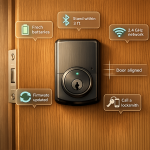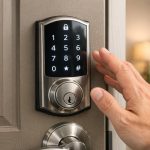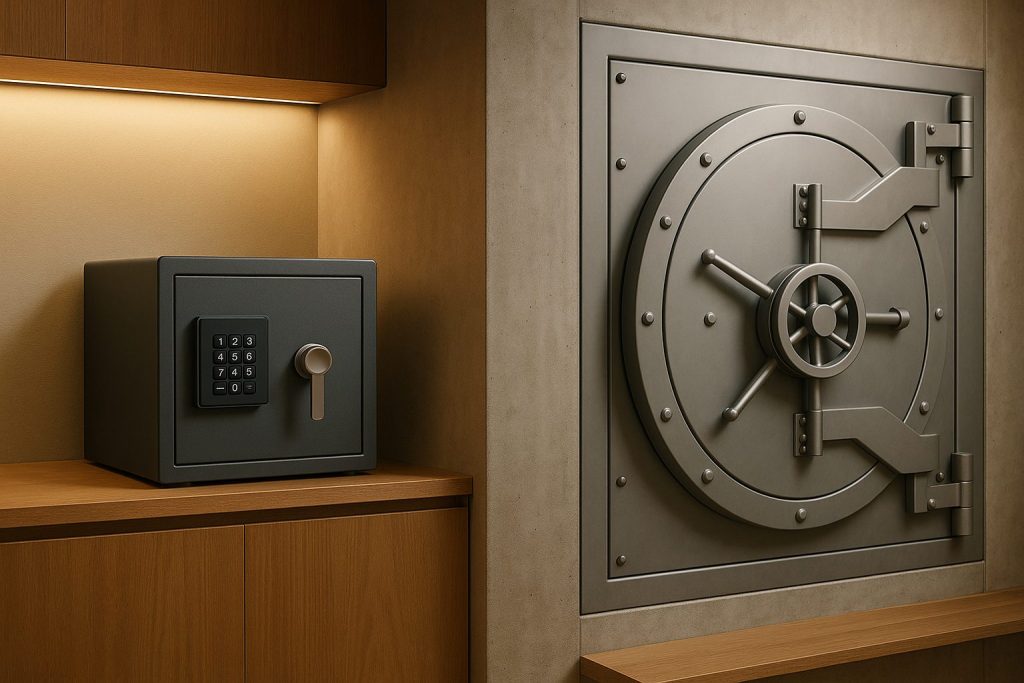Safes and vaults both protect valuables, but they serve different purposes. A safe is a portable, secure container designed for smaller items like documents, jewelry, or cash. In contrast, a vault is a permanent, room-sized structure built for high-value or large-volume storage, often used by banks or corporations.
Key Differences:
- Size: Safes are compact; vaults are large and immovable.
- Security: Vaults offer superior protection with reinforced construction and advanced locks.
- Cost: Safes are more affordable; vaults require significant investment and structural modifications.
- Use Case: Safes suit homes or small businesses, while vaults are ideal for high-value or sensitive assets.
Quick Comparison:
| Feature | Safes | Vaults |
|---|---|---|
| Size | Small, portable | Room-sized, permanent |
| Material | Steel with fireproof layers | Reinforced concrete and steel |
| Locking System | Digital, biometric, or manual | Advanced, dual-control locks |
| Cost | Affordable | Expensive |
| Installation | Simple | Requires construction |
| Best For | Homes, small businesses | Banks, corporations |
Choosing between a safe and a vault depends on your security needs, budget, and space. Safes are practical for everyday use, while vaults provide unmatched protection for high-value assets. Always consult a professional for proper installation and advice tailored to your requirements.
How They’re Built and Security Features
Materials and Construction
The way safes and vaults are built reveals crucial differences in their purpose and security levels. Safes are typically made from heavy-duty steel, often with fire-resistant insulation layered inside. Their doors are reinforced with steel and secured by strong bolts, making them a reliable deterrent against forced entry. While safes are portable, larger models usually need to be anchored to ensure stability and security.
Vaults, on the other hand, are a permanent part of a building’s structure. They are constructed using reinforced concrete combined with steel rebar, which adds strength and durability. Vault doors are massive and designed to withstand extreme force, featuring integrated locking bolts. Unlike safes, vaults are immovable due to their permanent installation, offering a higher level of structural security.
Locks and Protection Levels
Locking systems further differentiate safes and vaults, showcasing their varying levels of security. Safes often come with a range of locking options, including mechanical combination locks, electronic digital locks, and even biometric scanners. For residential use, electronic locks are common, allowing multiple user codes and often including a backup key for emergencies.
Vaults take security a step further with advanced locking mechanisms. Many include time-delay features and dual-control systems, requiring two separate authorizations to unlock. These added measures make vaults particularly effective at preventing unauthorized access.
Both safes and vaults also offer fire protection, but the level varies. Safes are designed to meet residential fire safety standards, while vaults provide extended fire resistance. Similarly, safes typically have basic water resistance to handle minor exposure, but vaults are built to protect contents from significant water damage.
Construction and Security Comparison
Here’s a quick comparison of their construction and security features:
| Feature | Safes | Vaults |
|---|---|---|
| Wall Construction | Heavy-duty steel with fire-resistant layers | Reinforced concrete with steel rebar |
| Door Construction | Steel door with secure bolts | Massive steel door with integrated bolts |
| Fire Resistance | Residential-level fire protection | Extended fire resistance |
| Installation | Portable; anchoring often required | Permanently integrated into buildings |
| Locking Mechanisms | Mechanical, digital, and biometric options | Time-delay and dual-control systems |
| Break-in Resistance | High protection against forced entry | Superior resistance to extreme force |
| Water Protection | Basic protection against minor exposure | Designed for significant water damage defense |
| Mobility | Movable with effort | Permanently fixed in place |
Choosing between a safe and a vault comes down to understanding these differences and matching them to your security needs. Whether you’re a homeowner or business owner in Pittsburgh, working with experts like Sherlock’s Locksmith can help you decide if a high-quality safe or a custom vault solution is the right fit for your requirements and budget. Professional installation ensures that your investment provides the protection you need.
When to Use Each Type
What Safes Are Used For
Safes provide practical security for homeowners and small businesses without requiring extensive construction work. In homes, they’re commonly used to protect valuables like jewelry, cash, important documents, and family heirlooms from theft or fire. Many Pittsburgh residents also rely on safes to store firearms securely, ensuring they’re out of reach from children.
For small businesses, safes play a key role in managing daily cash flow, safeguarding important documents, and securely storing items such as backup keys or receipts. In professional environments like medical offices or law firms, fireproof safes are especially useful for protecting sensitive records and legal papers.
Gun safes, in particular, are designed for both secure storage and quick access. Features like biometric locks are popular among gun owners, combining fast entry with added safety to prevent unauthorized access. Additionally, the portability of many safes makes them a great choice for renters or businesses that may need to move.
While safes are ideal for everyday security needs, vaults are the go-to solution for assets requiring the highest level of protection.
What Vaults Are Used For
Vaults are built for heavy-duty security, offering protection for high-value or large-volume assets. Banks use vaults to secure customer deposits, safe deposit boxes, and significant cash reserves. Government facilities – including military sites and federal buildings – rely on vaults to store classified documents and other sensitive materials.
Large corporations often install vaults to protect irreplaceable items like original contracts, intellectual property, and backup data storage. Museums and private collectors turn to climate-controlled vaults to preserve artwork, rare books, and historical artifacts. Similarly, data centers use enhanced security measures, including vault-like server rooms, to safeguard critical digital infrastructure. Due to their permanent nature, vaults are a solid choice for safeguarding assets over the long term.
What Affects Your Choice
Deciding between a safe and a vault comes down to how you plan to use it, the value of the assets being protected, and how often you need access. For items of modest value, a high-quality safe usually offers sufficient protection at a reasonable cost. However, for higher-value items or larger collections, a vault provides a higher level of security.
Access frequency is another key consideration. Safes are ideal for situations requiring regular access, like daily cash deposits or frequently used documents. Vaults, on the other hand, are better suited for items that need long-term storage or infrequent access, such as emergency reserves or archival materials.
Legal and insurance requirements may also play a role. Some insurance policies require high-value items to be stored in secure environments, and businesses handling firearms or controlled substances might need to meet specific regulatory standards.
If you rent your space, this could limit your ability to install a vault, as it often involves structural modifications. In such cases, a portable safe becomes a more practical option.
For tailored security solutions, consult with professionals. Sherlock’s Locksmith can evaluate your specific needs, assess your space, and recommend whether a high-grade safe or a custom vault is the better fit for your goals and budget.
Ultimately, the right choice balances your security needs with practical factors like budget, space, and access requirements. Taking the time to evaluate these considerations ensures you’ll find the solution that offers the right level of protection for your situation.
A Safe for Every Budget – What Kind of Safe Do You Need?
sbb-itb-643e28e
Cost and Practical Factors
Now that we’ve explored how safes and vaults are constructed, let’s dive into their costs and practical considerations.
Price Differences
Safes tend to be more budget-friendly, making them a go-to choice for homeowners and small businesses. Prices vary depending on factors like size, fire resistance, and security features. For instance, a basic safe designed for storing documents and small valuables will cost less than a high-end model equipped with advanced features like biometric locks.
On the other hand, commercial-grade safes with better security and fire protection come at a higher price. Vaults, however, represent a much larger financial commitment. Their higher cost stems from specialized construction, advanced security measures, and compliance with regulations.
When it comes to installation and upkeep, safes are simpler. They typically require just delivery and placement, with minimal maintenance like occasional lock servicing. Vaults, however, demand significant construction efforts, including structural modifications, ventilation systems, and electrical work. Maintenance is also more intensive, involving regular inspections, climate control adjustments, and updates as needed.
Financing options differ as well. Safes are often purchased outright or through standard credit plans, while vault installations may require specialized loans or leasing agreements due to their complexity and cost.
Space and Mobility Factors
Safes are compact and can fit into closets, basements, or other small areas without significant changes to the space. Larger safes, while heavier, can still be moved with professional assistance, making them a practical choice for renters or businesses that might relocate.
Vaults, however, are a permanent fixture. They require a dedicated room built to accommodate their size and security features. Unlike safes, vaults often need comprehensive HVAC systems to maintain proper temperature and humidity levels, which is crucial for protecting sensitive items.
Cost and Practicality Comparison
Here’s a side-by-side look at how safes and vaults stack up in terms of cost and practicality:
| Factor | Safes | Vaults |
|---|---|---|
| Initial Cost | Lower | Higher |
| Installation | Simple delivery and placement | Requires major construction |
| Maintenance | Minimal | Regular inspections and upkeep |
| Space Required | Compact, space-efficient | Needs a dedicated, larger area |
| Portability | Can be moved with help | Permanently installed |
| Setup Time | Quick and easy | Time-intensive due to construction |
| Customization | Limited to pre-made models | Fully customizable |
| Insurance Impact | Moderate premium reductions | May significantly lower premiums |
While vaults demand a larger upfront investment, they provide unmatched protection for high-value or sensitive items. They can also enhance the value of commercial properties over time.
Consulting with professionals can help you weigh the costs and practicalities to find the best solution for your security needs. Sherlock’s Locksmith offers expert assessments to help determine whether a high-quality safe or a custom vault is the right choice for your situation.
How to Choose the Right Option
Deciding between a safe and a vault boils down to understanding your specific security needs and practical limitations. The right choice depends on factors like what you’re protecting, your budget, and the space you have available. Let’s break down the key considerations to help you make an informed decision.
Main Decision Points
Security requirements should always be your starting point. If you’re safeguarding items like important documents, family heirlooms, or cash, a high-quality safe is usually sufficient. But for larger quantities of valuables, sensitive business records, or irreplaceable assets, the added security of a vault is the better option.
Your budget is another critical factor. Safes typically range from a few hundred to several thousand dollars, making them a more cost-effective option for most households. Vaults, on the other hand, can cost tens of thousands of dollars due to their size and the structural modifications they require.
Size and volume of items also dictate your choice. Safes are ideal for smaller items such as jewelry, electronics, and modest cash reserves. Vaults, however, offer the room needed for larger items, extensive document collections, or significant inventory.
Location considerations are often overlooked but are very important. Safes can be integrated into existing spaces like closets or under floors. Vaults, however, require a dedicated area and specific structural accommodations, making them more appropriate for permanent locations with ample space.
Risk assessment is key to determining the level of protection you need. Consider factors like local crime rates, risks of natural disasters, and the consequences of losing what you’re protecting. If you’re in a high-risk area or storing irreplaceable items, a vault may be worth the investment. For moderate risks, a high-quality safe could be enough.
Future needs should also be part of your decision. Safes are limited in their capacity to expand, while vaults can be designed with growth in mind. Think about whether your storage needs might increase over the next several years.
Getting Professional Help
When in doubt, consulting a professional can save you time, money, and future headaches. A security expert can assess your situation, recommend the right level of protection, and point out vulnerabilities you might not have considered.
Proper installation is just as important as choosing the right product. A poorly installed safe or vault can compromise its security. Professionals ensure everything is set up correctly, maximizing your investment.
For example, Sherlock’s Locksmith in Pittsburgh, PA offers security consultations tailored to your needs. Their certified technicians can help you decide between a safe and a vault, recommend solutions that fit your budget, and handle installation. Whether it’s a residential safe or a commercial vault, their expertise ensures you get the protection you need.
Professional advice is especially helpful when dealing with insurance requirements. Many insurance companies provide discounts for proper security measures, but they may require specific ratings or installation standards. A qualified locksmith can ensure your safe or vault meets these criteria, helping you maximize your insurance benefits.
Ongoing maintenance and support are additional perks of working with a professional. Safes and vaults need periodic upkeep to stay in top condition, and having a trusted locksmith on call ensures quick help if something goes wrong. Modern safes and vaults often include electronic locks, biometric systems, or integrated alarms, which require specialized knowledge to install and maintain properly. Having an expert handle these features ensures they work as intended.
Final Thoughts on Safes vs Vaults
When deciding between a safe and a vault, it all boils down to your specific needs, the level of security you’re after, and your budget. Safes are a practical, portable solution for protecting valuables in homes or small businesses. On the other hand, vaults are built for heavy-duty security, ideal for safeguarding larger collections, high-value assets, or irreplaceable items. However, they require a bigger financial commitment and dedicated space for installation.
If you’re looking to secure personal belongings or moderate assets, a safe is likely the way to go. For more extensive or high-value storage, a vault may be the better option. The key is finding the right balance between your security requirements, what you can afford, and the logistics of installation.
It’s always wise to consult professionals for proper installation and ongoing maintenance. Whether you’re considering a small home safe or a full-scale commercial vault, working with certified technicians – like the experts at Sherlock’s Locksmith – ensures that your security system is set up correctly. A poorly installed safe or vault can compromise the very security you’re investing in.
Ultimately, your choice should align with your risks, storage needs, and security objectives. Take the time to assess your situation and seek guidance from qualified experts to make the best decision for your circumstances.
FAQs
What should I consider when choosing between a safe and a vault for my home or business?
When choosing between a safe and a vault, it all comes down to your security needs, available space, and budget.
A vault is a permanent, heavy-duty structure built directly into your property. These are designed for storing high-value items or large amounts of valuables, offering top-tier protection. However, they come with a hefty price tag and require professional installation, making them a more significant investment.
A safe, in contrast, is portable, budget-friendly, and much simpler to set up. It’s ideal for securing everyday essentials like cash, jewelry, or important paperwork. While safes provide reliable protection, they don’t offer the same level of security or storage capacity as a vault.
To decide which is right for you, think about what you need to store, how much security you want, and how much you’re willing to spend. Vaults are perfect for long-term, high-security needs, while safes are a practical choice for convenience and affordability.
What are the differences in installation and maintenance between safes and vaults?
Installing a safe is a relatively simple process. It usually involves placing the safe in a secure, stable spot, anchoring it to deter theft, and taking steps to protect it from issues like humidity. Maintenance is minimal – just occasional cleaning, lubricating the locks, and periodic inspections to ensure everything works smoothly.
Vaults, on the other hand, are a bigger commitment. Their installation often requires significant structural changes, like reinforcing walls and securely anchoring the vault within the building. Keeping a vault in top condition also takes more effort, with regular inspections, lubrication of moving parts, and strict adherence to the manufacturer’s maintenance recommendations.
To sum it up, safes are easier to manage in terms of both installation and upkeep, while vaults provide a higher level of security at the cost of more effort and resources.
Can installing a safe or vault lower my insurance costs, and how do I meet insurance requirements?
Installing a safe or vault can sometimes result in lower insurance premiums because they add an extra layer of protection for your valuables. Many insurance companies may provide discounts or offer special coverage for items stored in safes or vaults that meet certain security standards, like fire-resistance or burglary ratings.
To align with your insurance policy, it’s important to select a safe or vault that meets the required security ratings, such as UL classifications. Once installed, notify your insurer and provide any necessary documentation to confirm the safe meets their standards – particularly if you’re safeguarding high-value items like jewelry, cash, or critical documents. This ensures proper coverage and could help you save on your premiums.









